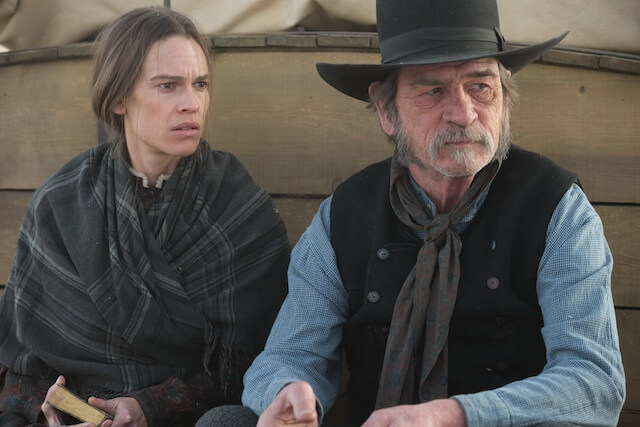‘The Homesman’ Tommy Lee Jones’ “The Homesman” is a Western that’s really an Eastern. Even in grimy anti-Westerns like “McCabe & Mrs. Miller” there’s a romanticism to Manifest Destiny. “The Homesman” boasts some spectacularly perdy vistas (courtesy “Brokeback Mountain” d.p. Rodrigo Prieto), but the lands are as beautiful as they are unforgiving, and usually arid. The people that trod upon them are worse. Everyone who has traveled into the great, dangerous unknown has gone some level of nuts, if they’ve survived at all. If your body doesn’t rot out West then your mind does, and the film even ends with one of its heroes advising a stranger to stay on the East Coast, where it’s safe. “The Homesman” is still very much a Western, albeit arriving in a climate in which the genre is definitely but probably dead. It even depicts that old Western standby: the long trek across hostile territory. Still, the leads are two types usually relegated to supporting. Hilary Swank plays Mary Bee Cuddy, who’s single at 30 and of course now a spinster. She elects herself to do a man’s job, transporting three women from her desolate, basically failed small town back East — women who’ve lost more marbles than most. At first going it alone, she winds up accompanied by an even more unreliable man than those in her town: a wild, dirty drifter in the Walter Brennan mold, played in full Tommy Lee Jones swing by Jones himself. He tells her his name is George Briggs, but it’s clear he pulled that name out from where the sun don’t shine. Speaking of which, he’s introduced in his long johns, scratching through a wedgie, his face black with soot and mumbling through a Tommy Lee Jonesish sing-song. She says he’s of low character; he calls her plain and bossy, as had one gentleman earlier. The plot finds them gradually exchanging self-respect, but love, pointedly, remains strictly practical. Cuddy has a habit of doing the man’s job and proposing marriage, purely to combine incomes, to those both well below her standards and quick to say no. Respect is the only currency here, but one doesn’t survive on respect. Despite the warm palette of the photography and numerous desktop-worthy horizon shots, “The Homesman”’ is unforgiving, clear-eyed and weird. There’s one genuinely shocking plot turn, plus a surreal stretch at a tony hotel sitting naked in the middle of nowhere, manned by one of the film’s many guest stars. (Still, this could be stranger; it was produced by Luc Besson, who’s spent a lifetime stealing American junk and mailing it back to us at least a little broken.) For an actor, Jones has a unique directorial vision, which involves knocking down those like him, which is to say old white man. “The Three Burials of Melquiades Estrada” was a hymn to immigrants; this is a feminist Western, where the lead is a female, and the men (even Jesse Plemons, aka “Breaking Bad”’s “Meth Damon”) unreliable or, usually, worse. Cuddy is tough but deeply, troublingly vulnerable; Swank portrays her as though she was barely holding down a lid on her roiling anxieties. Hollywood has never known what to do with the two-time Oscar-winner, and you sense in her performance a frustration at never found her place, except as a respectable performer who doesn’t let filmmakers or viewers down (save for some of her project choices). But “The Homesman” is no tract. The more one tries to peg it down, the more you see, like Warren Beatty’s John McCabe, that it has poetry in it.
Director: Tommy Lee Jones
Stars: Hilary Swank, Tommy Lee Jones
Rating: R
4 (out of 5) Globes
Review: ‘The Homesman’ is Tommy Lee Jones’ unforgiving and weird Western

Dawn Jones
Follow Matt Prigge on Twitter@mattprigge


















